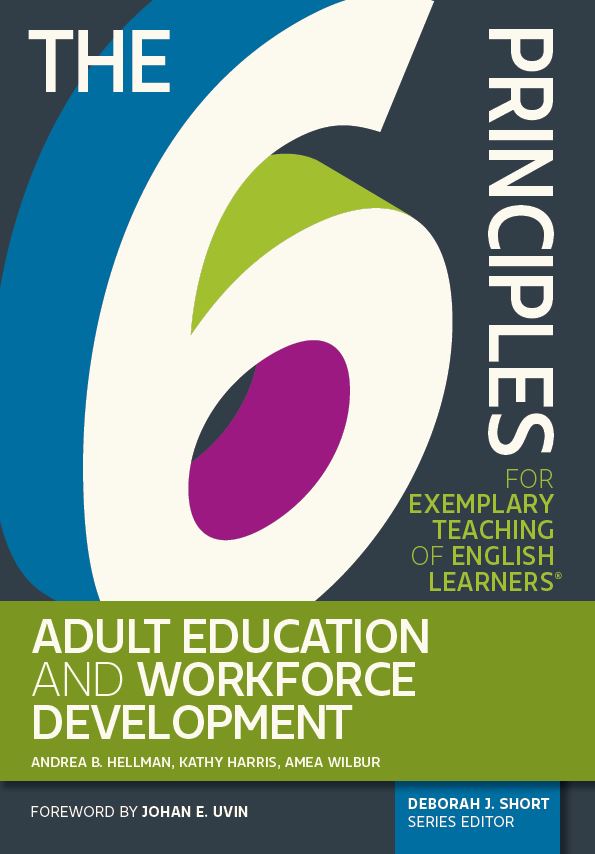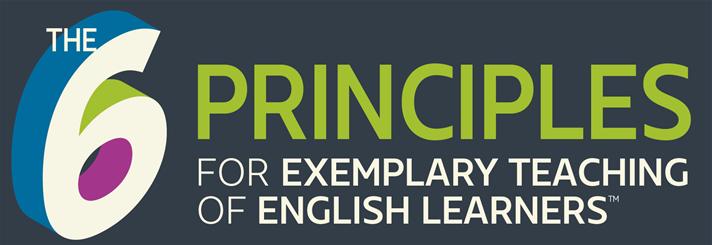
The 6 Principles for Exemplary Teaching of English Learners®: Adult Education and Workforce Development
Resource Page
This page complements the book, The 6 principles for Exemplary Teaching of English Learners®: Adult Education and Workforce Development. Organized by book chapter, these additional materials and resources can help you learn more about The 6 Principles® and how to implement them in your classroom, program, or school. For the purposes of a book study group or self-reflection, discussion questions for each chapter are also provided.
For additional resources and information on The 6 Principles®, please visit The Principles and Products pages.
Chapter 1. Teaching Adults English Language and Literacy with The 6 Principles |
The 6 Principles Quick Overview:
Further Reading
- Framework for Quality Professional Development for Practitioners Working with Adult English Language Learners
- Canadian Language Benchmarks: English as a Second Language for Adults
- The Integration of Immigrants into American Society
- International Migration Outlook 2018
- Meeting the Language Needs of Today’s Adult English Language Learners: Issue Brief
- Adult English Language Proficiency Standards for Adult Education
Chapter 2. What Teachers Should Know About English Language and Literacy Development to Plan Instruction for Adult Learners |
Additional Teaching Resources
The following links are resources mentioned in the chapter, or related to them, that can help teachers incorporate The 6 Principles® into their instruction.
- The Center for Study of Adult Literacy
- Journeys: An Anthology of Adult Student Writing
- English language functioning levels and the documents that define them
- Educational Functioning Level Descriptors for ESL (United States)
- English Language Proficiency Standards for Adult Education (United States)
- Associated document: College and Career Readiness Standards (United States)
- Canadian Language Benchmarks
- Canadian Language Benchmarks: ESL for Adults
- Australian Core Skills Framework and Pre Level 1 Supplement 2017
- Common European Framework of Reference for Languages: Learning, Teaching, Assessment
Further Reading
- Promoting the Educational Success of Children and Youth Learning English: Promising Futures
- How People Learn: Learners, Contexts, and Cultures
- NRS Technical Assistance Guide for Performance Accountability under the Workforce Innovation and Opportunity Act: Exhibit 2.2
Chapter 3. Teaching with The 6 Principles |
Additional Teaching Resources
The following links are resources mentioned in the chapter, which can help teachers incorporate The 6 Principles® into their instruction.
The Cultural Orientation Website provides in-depth introductions to major refugee groups in the United States in the form of briefs, videos, and image libraries.
The Government of Canada maintains an archive for researching every ethnocultural immigrant group in the country.
How to select words to teach
- New General Service List: The most important words to learn
- Academic Vocabulary Word Lists
Teachers can help learners share the products of their learning in meaningful ways
- Minnesota’s immigrant stories collection (United States)
- Immigration Stories (Canada)
Instructional resources for working with adult English learners
- LINCS Resource Collection (United States)
- Centre for Canadian Language Benchmarks
- Adult Migrant English Program (Australia)
- Language Support for Adult Refugees: A Council of Europe Toolkit
Additional tools available on Pinterest.
Readability measuring tool: Coh-Metrix
Web-based texts on lower reading levels about topics that most adults find useful and interesting
The GO TO Strategies: Scaffolding Options for Teachers of English Language Learners, K-12, many of which are very useful in the adult English language learning classroom
Further Reading
- Preparing English Learners for Work and Career Pathways: Companion Learning Resource
- Promoting Learner Engagement When Working with Adult English Language Learners
- Integrating Digital Literacy into English Language Instruction: Issue Brief
- Blended Learning for the Adult Education Classroom
- Accountable Talk Sourcebook: For Classroom Conversation That Works
- College and Career Readiness Standards for Adult Education
- Adult English Language Proficiency Standards for Adult Education
Chapter 4. Addressing the Challengers with Adult English Learners |
Additional Teaching Resources
The following links are resources mentioned in the chapter, or related to them, which can help teachers incorporate The 6 Principles® into their instruction.
Mutually Adaptive Learning Paradigm® Instructional Approach
Accounts of migration journeys of people from different ethnicities and circumstances
- Passages Canada
- Immigration History Research Center (United States)
Guidance for teaching English learners with low literacy
- ESL Literacy Network, Bow Valley College | School of Global Access
Universal Design for Learning
Further Reading
- Literacy Education and Second Language Learning for Adults (LESLLA) Proceedings
- A Practical Guide to Teaching ESL Literacy
- Using Oral Language Skills to Build on the Emerging Literacy of Adult English Learners
- Strategies for Teaching Adult Refugees in the ELL Classroom
- Beyond Trauma: Language Learning Strategies for New Canadians Living with Trauma
- Critiquing Adult Participation in Education
- Global Trends: Forced Displacement in 2017
Guidance for teaching English learners struggling with mental health issues
Hewitt, J. E. (2017). Yes I Can: A Mental Health Guide for Adult Literacy Facilitators
Pashang S., Biazar B., Payne D.E., & Kaya Z. (2018). Teaching English as an Additional Language (EAL) to Refugees: Trauma and Resilience. In S. Pashang, N. Khanlou, & J Clarke J. (Eds.), Today’s Youth and Mental Health. Advances in Mental Health and Addiction (pp. 359-378). Springer, Cham.
Chapter 5. The 6 Principles in Different Program Contexts |
The following links are resources mentioned in the chapter, or related to them, which can help teachers realize The 6 Principles® into their instruction.
Learning at Work in the United States
- Educational Functioning Level Descriptors for ESL (United States)
- English Language Proficiency Standards for Adult Education (United States)
- Associated document: College and Career Readiness Standards (United States)
Preparing for Hospitality Careers in Canada
Preparing for Work in Australia
- Skills for Education and Employment (SEE) program (Australia)
- Australian Core Skills Framework
- EAL/D Teacher Resources- Adult
- Pronunciation and vocabulary practice videos: Mark Kulek’s English Conversation Practice
- Online quiz and flashcard tool: Quizlet
Learning in Affordable Housing in the United States
An Adult Basic Education ESOL Program at a Community College
- College and Career Readiness Standards (United States)
- English Language Proficiency Standards for Adult Education (United States)
- Pew Research Center Mobile Fact Sheet (United States)
- EveryoneOn on to find low cost internet access (United States)
Further Reading
- TESOL Technology Standards
- Integrating Digital Literacy into English Language Instruction: Companion learning resource
- Meeting the Language Needs of Today's English Language Learner: Companion learning resource
- Preparing English Learners for Work and Career Pathways: Companion learning resource
Additional Content & Resources |
View More Resources on the Products & In The News pages.

